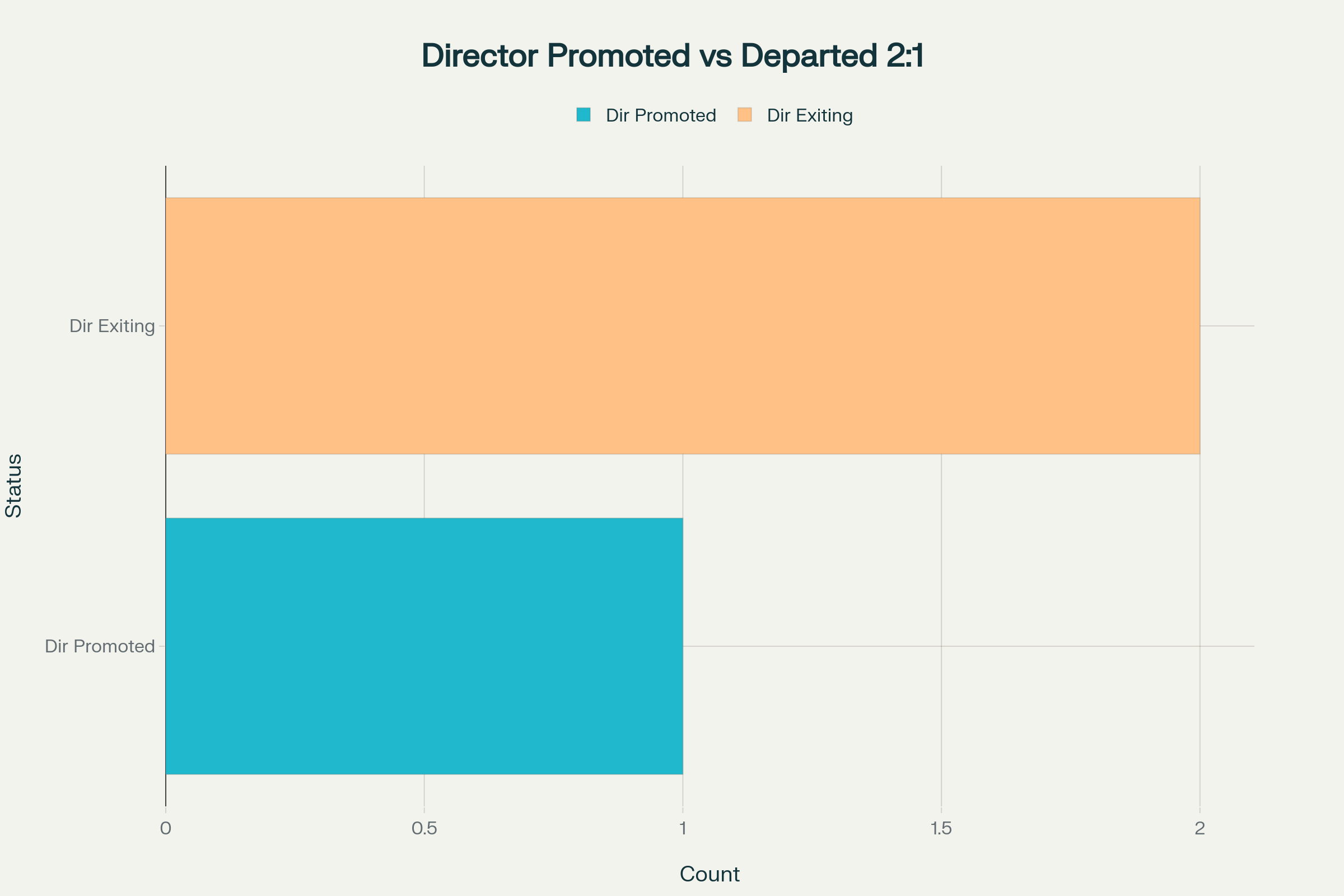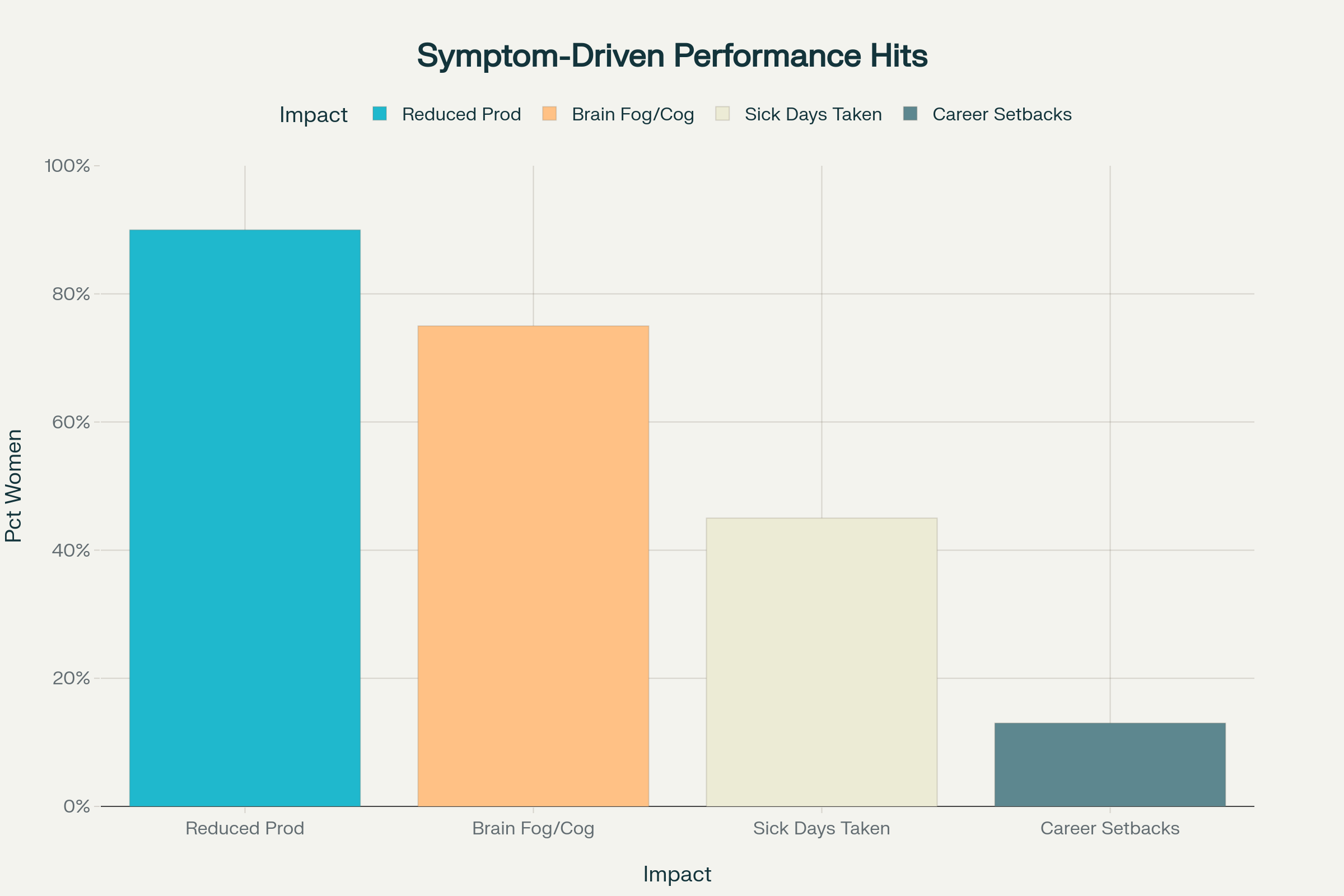Why 75% of Women Struggle in Silence at Work: The Untold Menopause Crisis
Oct 11, 2025
Experienced women are leaving leadership roles in record numbers, and it's costing organizations billions. Yet the real story—how menopause symptoms drive workplace exits—remains largely untold. Here's the hidden crisis affecting three-quarters of working women in midlife.
Part 2 of 5: The Menopause Crisis America Ignores
You sit in the conference room, the presentation slides blurring slightly as you try to focus on the quarterly review. You know this material—you've been in this industry for years, maybe decades. You've led teams, made decisions, solved complex problems that others couldn't crack. But today, the words seem to float just out of reach, and you find yourself nodding along while internally scrambling to piece together thoughts that used to come so naturally.
Later, you'll wonder if anyone noticed. You'll replay the meeting, searching for signs that your colleagues could see through what felt like a performance of your former sharp self. And you'll do what 75% of women experiencing menopause do: you'll struggle in silence, wondering if this is just your new normal.
The truth is, what you're experiencing isn't just personal—it's part of a workplace crisis that's costing the American economy billions while devastating women's careers during what should be their most influential years.
The Silent Exodus: When Experience Walks Away
Here's a statistic that should make every CEO take notice: women leaders are leaving organizations at the highest rate ever recorded¹. For every woman promoted to director level, two women directors leave their companies². This isn't just about career pivots or lifestyle changes—this is about women in their prime professional years feeling forced to step back from leadership roles they've spent decades building toward.

The timing isn't coincidental. These departures peak precisely when women are most likely to be navigating perimenopause and menopause, typically between ages 45-55. The very years when their experience, judgment, and leadership capabilities should be most valued become the years when untreated symptoms make professional demands feel overwhelming.
Think about the institutional knowledge walking out the door. Think about the mentorship, the client relationships, the strategic thinking developed over decades of experience. This isn't just a women's issue—it's an economic catastrophe hiding in plain sight.
The Numbers Behind Your Workplace Struggles
If you've been questioning your professional abilities lately, the research might help you understand what's really happening. The statistics around menopause and workplace performance are both sobering and validating³:
Cognitive Impact at Work:
- 75% of women experience brain fog and cognitive difficulties that directly impair job performance⁴
- Memory issues affect concentration during meetings, presentations, and complex problem-solving
- Processing speed decreases, making quick decision-making more challenging
- Multi-tasking becomes noticeably more difficult, especially under pressure
Workplace Behavior Changes:
- 90% of menopausal women report reduced productivity at work⁵
- 45% take sick days specifically due to menopause symptoms⁶
- 13% report adverse work outcomes including job changes, early retirement, or declining promotions⁷
- Many begin avoiding leadership opportunities they would have previously pursued with confidence

The Hidden Accommodations:
- Working longer hours to complete tasks that previously took less time
- Avoiding presentations or public speaking due to hot flashes or brain fog
- Declining travel assignments due to unpredictable symptoms
- Passing on stretch assignments that might have advanced careers but feel too risky given cognitive uncertainty
When Your Body Betrays You at Work: The Daily Reality
Let's talk about what workplace struggles during perimenopause and menopause actually look like in daily work life, because the statistics only tell part of the story. Maybe you recognize some of these moments:
The Meeting Fog: You're in a strategy session, and suddenly you can't follow the thread of conversation. Words that should trigger immediate associations feel foreign. You find yourself buying time with phrases like "That's an interesting point" while your brain scrambles to catch up, wondering if everyone can tell you're lost.
The Presentation Panic: Standing in front of the board, you feel the heat rising up your neck just as you reach the most critical slide. Your carefully prepared talking points evaporate as you try to manage both the hot flash and the content, knowing that any visible discomfort will be noted and potentially misinterpreted as lack of preparation or confidence.
The Email Struggle: Crafting responses that used to flow easily now requires multiple drafts. You find yourself second-guessing word choices, forgetting to include attachments, or losing track of complex email threads that span multiple decisions and stakeholders.
The Innovation Drain: Those moments of creative insight, the "aha" connections that made you valuable as a strategic thinker, seem to happen less frequently. It's not that you've lost your intelligence—it's that the hormonal changes affecting your brain make those cognitive leaps more elusive.
The Confidence Crisis: Perhaps most devastating of all, you begin to question abilities you've relied on for decades. The uncertainty about when symptoms will strike makes you hesitant to volunteer for high-visibility projects or speak up in meetings where you used to be a confident contributor.
The Leadership Pipeline Crisis: Losing Our Most Experienced Voices
Perhaps the most devastating aspect of this workplace crisis is its impact on leadership development and organizational knowledge retention. Women who have spent 20-30 years building expertise, developing judgment, and earning credibility are stepping back just as they reach their peak potential for organizational impact.
The cognitive impacts of untreated menopause directly impair innovation capacity during the years when women are positioned to make their greatest contributions. This represents a catastrophic loss of human capital—not just for individual women, but for organizations and society as a whole.

Consider this: many of the women stepping back from leadership roles are Gen X and early Millennial professionals who broke barriers, developed skills during periods of rapid technological change, and possess the perfect combination of experience and contemporary knowledge to guide organizations through current challenges. Their departure creates a leadership vacuum that affects entire industries.
The Mentorship Loss: When experienced women leave leadership roles, they take with them not just their own capabilities, but their potential to mentor and develop the next generation of leaders.
The Diversity Setback: Organizations that have invested decades in building diverse leadership pipelines watch that progress evaporate as women in their peak career years feel forced to step back.
The Innovation Gap: The unique perspectives and problem-solving approaches that come from diverse leadership teams diminish when experienced women can't maintain their professional momentum through this transition.
The Intersection of Symptoms and Professional Success
What makes the workplace impact so challenging is how menopause symptoms intersect with the exact capabilities that professional success requires:
Brain Fog Meets Strategic Thinking: Complex problem-solving requires clear thinking and the ability to hold multiple variables in mind simultaneously, but brain fog creates moments of mental cloudiness that can undermine confidence in high-stakes situations.
Sleep Disruption Meets Leadership Demands: Executive roles often require sustained energy and sharp decision-making throughout long days, but the sleep disturbances common in menopause create a constant state of fatigue that compounds other symptoms.
Mood Changes Meet Team Leadership: Leading teams requires emotional regulation, consistent communication, and the ability to inspire confidence, but hormonal fluctuations can create irritability or emotional volatility that feels unprofessional and difficult to control.
Hot Flashes Meet Public Speaking: Presenting to clients, boards, or large teams becomes anxiety-provoking when you can't predict when a hot flash might strike during a critical moment, adding performance anxiety to an already challenging symptom.
Memory Issues Meet Detail Management: Professional roles often require tracking numerous details, deadlines, and commitments, but the memory challenges that accompany menopause can make this mental juggling act feel impossible.
The Economic Reality: What Organizations Are Really Losing
The workplace exodus of experienced women during menopause represents more than individual career setbacks—it's an economic disaster with quantifiable costs⁸:

Direct Productivity Losses: The $1.8 billion in annual lost productivity from menopause symptoms represents real work not getting done, projects delayed, and opportunities missed⁹.
Turnover Costs: Replacing experienced employees costs organizations 50-200% of annual salary when you factor in recruitment, training, and the time it takes new hires to reach full productivity¹⁰.
Knowledge Drain: When women with decades of experience leave, they take institutional knowledge that can't be easily replaced or transferred.
Innovation Reduction: Diverse leadership teams consistently outperform homogeneous ones in innovation and problem-solving, but the menopause-related leadership exodus reduces this diversity advantage.
Competitive Disadvantage: Organizations that fail to support women through this transition while competitors do will find themselves at a significant talent retention and recruitment disadvantage.
The Power of Understanding: Your Professional Worth Remains Intact
Here's what's crucial to understand if you're struggling professionally during this transition: your professional value hasn't diminished. Your expertise hasn't evaporated. Your judgment hasn't failed. You're experiencing the effects of a biological transition that affects cognitive function in predictable, temporary, and often treatable ways.
The research is clear that with proper treatment, 60-80% of women see significant improvement in cognitive symptoms¹¹. This means that the career challenges you're experiencing aren't permanent limitations—they're temporary obstacles that can be addressed with the right support and medical care.
Your decades of experience, your hard-won skills, your professional instincts—none of these disappear because of hormonal fluctuations. They may be temporarily clouded, but they remain intact and valuable.
Small Steps Toward Professional Support: The Power of Little Approach
The Power of Little approach to workplace challenges during menopause isn't about dramatic confrontations or major career changes. It's about small, strategic steps that can make a meaningful difference while you navigate this transition:
Start with Self-Understanding: Document when your symptoms are most challenging. Is brain fog worse in the morning? Do afternoon energy crashes affect your performance? Understanding your patterns helps you advocate for yourself more effectively and make strategic decisions about when to schedule important meetings or tackle complex projects.
Consider Gentle Disclosure: You don't owe anyone your medical information, but sometimes trusted colleagues or supervisors can provide support if they understand what you're experiencing. This might be as simple as saying, "I'm navigating some health changes that occasionally affect my energy levels."
Explore Workplace Resources: Many companies offer Employee Assistance Programs, flexible work arrangements, or health benefits that could support you during this transition. HR departments are increasingly aware of menopause as a workplace issue and may have resources you're not aware of.
Build Your Support Network: Connect with other women in your organization or industry who may be experiencing similar challenges. Professional women's groups increasingly include menopause support as part of their mission.
Adjust Your Strategies: Work with your natural energy patterns rather than against them. If you're sharpest in the morning, schedule important meetings then. If you need more time to process complex information, build that into your planning.
Practice Professional Self-Compassion: On days when your thinking feels unclear, remind yourself that this is temporary and doesn't reflect your true capabilities. Be as kind to yourself as you would be to a colleague experiencing health challenges.
What's Changing: Reason for Professional Hope
The workplace landscape around menopause is beginning to shift, driven by both the economic reality of losing experienced talent and growing awareness of women's health issues. Forward-thinking companies are developing menopause-friendly policies, providing manager training, and recognizing that supporting women through this transition isn't just good for employees—it's good for business.
Some progressive organizations now offer¹²:
- Flexible work arrangements during symptom management, including temperature-controlled workspaces and modified travel schedules
- Comprehensive healthcare benefits including menopause treatment and specialist care
- Employee resource groups focused on midlife transitions and women's health
- Manager training on supporting employees through health transitions without discrimination
- Wellness programs that specifically address menopause symptoms and treatment options
These changes represent a recognition that supporting women through natural life transitions is both an ethical imperative and a business necessity in competitive talent markets.
The Advocacy Opportunity: Your Voice Matters
If you're experiencing workplace challenges related to menopause symptoms, you have an opportunity to be part of the solution. This doesn't mean you need to become a full-time advocate or share intimate details about your health—it means recognizing that your experience matters and that small actions can contribute to meaningful change.
Document Your Experience: Keep notes about how symptoms affect your work performance and what accommodations might help. This information could be valuable for HR policy development or healthcare discussions.
Connect with Others: Building networks with other women experiencing similar challenges creates both personal support and collective voice for change.
Share Resources: When you find helpful information or treatment options, sharing with trusted colleagues can create ripple effects of support and awareness.
Advocate for Policy Changes: This might be as simple as suggesting menopause education for managers or requesting that health benefits include comprehensive women's health care.
July 17th: An Important Step
In four days, an expert panel at the FDA will discuss changes that could significantly improve access to menopause treatment. This isn't just about individual health—it's about workplace productivity, leadership retention, and economic impact.
When women can access effective treatment for menopause symptoms, workplace outcomes improve dramatically¹³:
- Cognitive function often returns to pre-menopause levels
- Productivity increases as symptoms become manageable
- Leadership capacity is restored, benefiting entire organizations
- Career confidence returns, leading to better decision-making and innovation
The cognitive benefits could restore innovation capacity for millions of women at their career peaks, potentially adding billions in unrealized value to the economy¹⁴.
Tomorrow's Conversation: The Personal Cost
Tomorrow, we'll explore perhaps the most heartbreaking aspect of untreated menopause: the relationship toll. We'll discuss the statistics nobody talks about—how the very years that challenge us professionally are also straining our most important personal relationships, and what that means for family stability and personal well-being.
We'll examine how the same hormonal changes affecting your workplace performance are also impacting your relationships, your sense of self, and your family dynamics—and why understanding this connection is crucial for comprehensive support.
Your Professional Journey Continues
For today, if you're struggling professionally during this transition, please remember: you're not failing. You're navigating a significant biological change while trying to maintain professional excellence, and that actually requires tremendous strength and resilience.
Your experience matters. Your voice matters. Your career matters. The challenges you're facing highlight the urgent need for better workplace support, healthcare access, and understanding of this natural life transition.
The fog you're experiencing doesn't define your professional worth—it highlights the urgent need for better support, understanding, and treatment. You have decades of valuable experience and wisdom that your organization and industry need. With the right support and possibly treatment, you can continue to contribute at the highest levels.
And on July 17th, there's an opportunity to support changes that could help millions of women like you have better access to treatment for specific symptoms that impact quality of life.
Tomorrow, we'll turn our attention to how these same symptoms affect your most intimate relationships and what that means for the people you love most.
Until then, be gentle with yourself professionally. You're doing something incredibly challenging—maintaining career momentum through a major biological transition—and that deserves recognition, not criticism.
Navigating career challenges during midlife transitions? Find gentle, practical resources at poweroflittle.com—no pressure, just support for wherever you are in your professional journey.
Ready to be part of workplace change? Learn about the July 17th FDA panel at letstalkmenopause.org/unboxingmenopause and discover how your voice can support policy changes that benefit millions of working women. Your professional experience and perspective matter in this conversation.
This post is part of a 5-part series exploring the hidden economic and social costs of inadequate menopause care in America. Tomorrow, we'll examine how menopause symptoms affect relationships and family stability—another hidden cost of this healthcare gap.
References
- LeanIn.Org. (2022). Women in the workplace 2022: The state of the pipeline. Retrieved from https://leanin.org/women-in-the-workplace/2022/the-state-of-the-pipeline
- McKinsey & Company. (2022). Women in the workplace: Leadership retention crisis. Retrieved from https://www.mckinsey.com/featured-insights/diversity-and-inclusion/women-in-the-workplace
- AARP Public Policy Institute. (2024). Menopause in the workplace: Impact on productivity and career advancement. Retrieved from https://www.aarp.org/pri/topics/work-finances-retirement/employers-workforce/menopause-workplace/
- Mayo Clinic. (2024). Menopause workplace challenges and cognitive impact study. Mayo Clinic Proceedings
- Business Wire. (2021). New survey from Gennev reveals the impact menopause has on productivity in the workplace. Retrieved from https://www.businesswire.com/news/home/20210708005184/en/
- EurekAlert! (2024). Menopause symptoms significantly impact workplace productivity, study finds. Retrieved from https://www.eurekalert.org/news-releases/1060823
- Occupational Medicine. (2023). Menopause in the workplace: A systematic review of workplace accommodations. Retrieved from https://academic.oup.com/occmed/article/73/6/332/7237845
- Mayo Clinic. (2023). Menopause in the workplace: Challenges, impact, and next steps. Mayo Clinic Proceedings
- ACDIS. (2024). Medical expenses from menopause costs $26.6 billion a year, Mayo Clinic says. Retrieved from https://acdis.org/articles/news-medical-expenses-menopause-costs-266-billion-year-mayo-clinic-says
- Society for Human Resource Management. (2024). The cost of employee turnover in healthcare and professional services
- North American Menopause Society. (2024). Treatment effectiveness for cognitive symptoms in menopause. Clinical practice guidelines
- World Economic Forum. (2024). Menopause womens health equality workplace initiatives. Retrieved from https://www.weforum.org/stories/2024/10/menopause-womens-health-equality-workplace/
- Frontiers in Endocrinology. (2024). Workplace outcomes following menopause treatment interventions
- Morgan Stanley. (2024). Gender health gap technology and economic opportunity analysis. Retrieved from https://www.morganstanley.com/ideas/gender-health-gap-technology-startups-womens-health
Complete research citations and additional sources available here: Workplace Impact Full Research Reference
Weekly Gentle Support for Your Midlife Journey
Gentle prompts, science-backed tips, and stories of tiny wins — delivered every Friday.
By subscribing, you agree to receive ongoing updates



